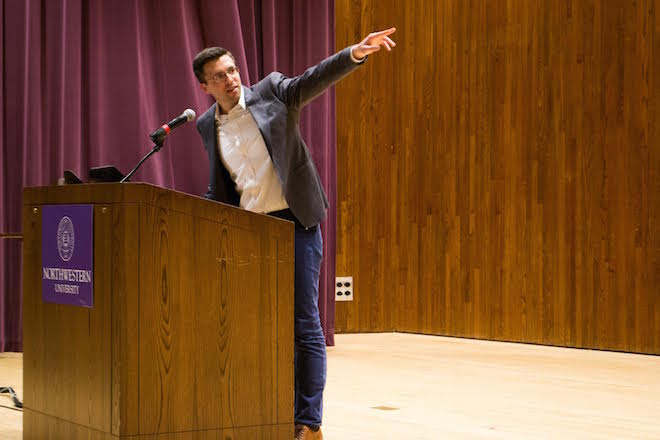
Photo by Natalie Escobar / North By Northwestern
When Vox’s editor-in-chief Ezra Klein took the stage of the McCormick Auditorium on Thursday night, he was quick to point out two problematic characteristics of most of the people in the room: their interest in U.S. politics and their intelligence.
“The convergence of those two things has the tendency to make you very stupid,” he said.
In front of a crowd of about 100 people, Klein discussed the state of domestic politics in relation to social psychology and media as part of the Contemporary Thought Speaker Series. Because political beliefs are tied to people’s identities, he said, people rarely challenge themselves to seek out or consider opposing perspectives, which hinders dialogue.
He said that smart, politically minded people are particularly complicit in this type of behavior. Their tendency to seek out certain kinds of information that align with their existing perspectives is a mechanism for “partisan self-deception,” he said.
“The world is full of so many facts. There is so much information to take in,” he said. “There are so many sources who will arrange it in just the right way, to make you believe anything you want to believe.”
He provided examples of studies in which people only accept the validity of opinions (even expert ones) if they align with their pre-existing beliefs. When presented with facts contradicting their worldviews, he said, people become “motivated skeptics.”
Concerns about “identity-protective cognition” have driven a lot of Klein’s approach to how to cover news at Vox, he said. He fears that his reporters’ own biases will contribute to the problem of polarization, since their own conceptualizations of the truth influence their writing.
Klein also pointed out that it’s rare for influential media figures like Sean Hannity and Rachel Maddow to acknowledge the validity of the beliefs of the party they don’t align with. Because people want to remain in good standing with their community, pundits like Hannity never seem to deviate from their group’s stances.
However, Klein did talk about one “Tea Party patriot” YouTube video-blogger who proved to be a major exception to the rule. This man, who had previously posted videos espousing hyper-conservative beliefs, posted a video acknowledging the benefits of the Affordable Care Act, even though the vast majority of Republicans oppose the legislation. This struck Klein as very strange, especially since the blogger ran the risk of angering his fellow Tea Party members.
“It’s a really painful thing to be on the wrong side of your tribe,” Klein said.
Following his prepared remarks, Klein elaborated on Vox’s mission of contextualizing and analyzing the news in response to an audience member’s question. He said that his organization aims to leverage their digital platform to “do news better” instead of just putting traditional print journalism pieces online.
Despite the success of tools like “card stacks”—explanatory guides on complex topics like Obamacare, the Iranian nuclear deal and same-sex marriage initiatives—Klein believes that Vox still has a lot of room for improvement. Editorial guides are in the process of being overhauled in preparation for a “new product” that will be unveiled in May, he said.
In response to a question about climate change policy, Klein criticized Republican elites in Congress for not prioritizing the issue and denying the existence of the problem. He said that he worries that leaders don’t understand how to go about addressing global warming.
“It is always bad when people’s ideas for how to solve something become indistinguishable from the ideas that comic book supervillains have about to ransom the human race,” he said. “You just hear people talking, like, ‘We’re going to put mirrors in space.’ You know, to block the sun.”
In the end, he said, he hopes his organization will encourage people be more receptive to alternative points of view, but recognizes the enormity of that goal.
“My job, on some level, is to change people’s minds,” he said. “I think I’ve done that, like, three times.”
The Contemporary Thought Speaker Series invited Klein to campus because of his unique form of news analysis, said board member Ben Zimmermann*. He said he was particularly intrigued about Klein’s take on political polarization.
“It answers the question that a lot of people ask about the American political system in a way that not many people think,” Zimmermann said. “It was an interesting spin on the root of what’s wrong with politics today in the U.S.”
*Editor's Note: Ben Zimmermann is an assistant editor for North By Northwestern Magazine and an online contributor